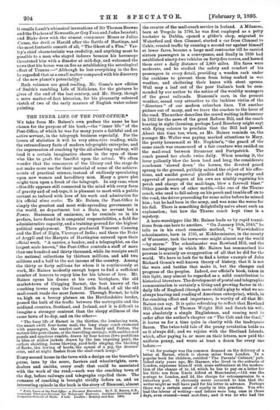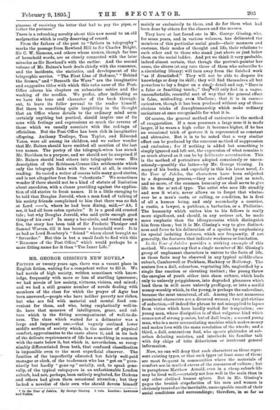THE INNER LIFE OF THE POST-OFFICE.* WE take from Mr.
Baines's own preface the name he has chosen for the purpose of his book,—the "inner life" of the Post-Office, of which he was for many years a faithful and an active servant, in the telegraph business especially. For the lovers of statistics it will be very attractive reading, while the extraordinary facts of modern telegraphic enterprise, and the supersession of coaching by the all-absorbing railway, will tend it a certain imaginative charm in the eyes of those who like to graft the fanciful upon the actual. We often wonder that the romancers of the library and the stage do uot make more use for their material of some of the achieve- ments of practical science, instead of endlessly speculating upon new women and hereditary men. Many a grave plot might turn upon a freak of the telegraph. In any case, when office-life appears still connected in the mind with every form of gravity and of red-tape, it is pleasant to meet with a public servant so imbued with love of his work and admiration for his official alma mater. To Mr. Baines, the Post-Office is simply the greatest and most wide-spreading government in the world, no department but a State, no servant but a Power. Statesmen of eminence, as he reminds us in his preface, have found in it congenial responsibilities, a field for administrative capacity, and a training-ground for the highest political employment. There graduated Viscount Canning and the Earl of Elgin, Viceroys of India ; and there the Duke of Argyll and the Marquis of Hartington entered upon their official work. "A carrier, a banker, and a telegraphist, on the largest scale known," the Post-Office controls a staff of more than one hundred and thirty thousand, while its receipts swell the national collections by thirteen millions, and add two millions and a half to the net income of the country. Among the thirty or forty millions for whom it is continuously at work, Mr. Baines modestly enough hopes to find a sufficient number of hearers to repay him for his labour of love. Mr. Baines opens his drama at his own birthplace, the old market-town of Chipping Barnet, the best known of the coaching towns upon the Great North Road, of all the old mail-coach roads the most famous. Through Barnet, he tells us, high on a breezy plateau on the Hertfordshire border, passed the bulk of the traffic between the metropolis and the midland counties, Scotland, and Ireland, and it is difficult to imagine a stronger contrast than the sleepy stillness of the same town of to-day, and on the other-
" The busy life of Barnet in the thirties, the lumbering wain, the smart swift four-horse mail, the long stage coach crammed with passengers, the market cart from Sandy and Potton, the meteor-like post-chaise, or the travelling carriage, with emblazoned panels and spacious rumble, drawn by four horses (two postilions in blue or yellow jackets drawn by the less imposing pair), the ostlers shouting, horns blowing, yard-bells ringing, the bleating of flocks, the lowing of herds, the squeal of a pig, the drovers' cries, and at night flashes from the mail-coach lamp.E."
Every second house in the town with a design on the traveller's purse, inns by the score, farriers and wheelwrights, corn- dealers and smiths, every craft that could be associated with the work of the road,—such was the coaching town of the day, before railways and telegraphs expelled them. The romance of coaching is brought vividly before us, and an interesting episode in the book is the story of Bianconi, almost Forty Years at the Post-Office: a Per,onal Narrative. By F. E. Baines, 0.B., enmetime Surreyor-General for Telegraph Bneineas, Assistant-Secretary and Inspector-General of Mails. 2 vole. London : Bentley and Son. 1895.
the creator of the mail-coach service in Ireland. A Milanese, born at Tregolo in 1786, he was first employed as a petty huckster in Dublin, opened a gilder's shop, migrated to Waterford and then Clonmel, started a car from Clonmel to Cahir, created traffic by running a second car against himself at lower fares, became a large mail contractor till be carried sixteen passengers in a conveyance, and finally in 1838 had established ninety-two vehicles on forty-five routes, and horsed them over a daily distance of 3,800 miles. His fares were moderate, and he studied the safety and comfort of his passengers in every detail, providing a wooden rack under the cushions to prevent them from being soaked in wet weather, and sheltering their knees with stout aprons.
Well may a leaf out of the poor Italian's book be com- mended by our author to the notice of the wealthy managers of the great railroads. Bianconi's cars, in the present weather, sound very attractive to the luckless victim of the " directors " of our modern suburban lines. Yet another picture out of many, and we leave the coaches to the lover of the road. The author describes the crowd waiting in Stranraer in 1832 for the news of the great Reform Bill, and the coach heaving in sight (looming, perhaps Lord Rosebery might say) with flying colours to proclaim that the Bill had passed.
About this time too, when, as Mr. Baines reminds us, the younger Mr. Weller was paying marked attentions to Mary, the pretty housemaid at Mr. Napkins's, "the guard of the same coach was enamoured of a fair creature who resided on the mail-road between Stranraer and Portpatrick. The coach passed her abode twice daily. When nearing it, the lover gallantly blew the horn loud and long, the considerate coachman slowed down' the horses, the devoted guard sprang to the ground, publicly saluted the object of his affec- tions, and amidst general plaudits and the sympathy and approval of passengers of his own sex nimbly regaining his perch and charge of the mail-bags, blew a farewell blast."
Other guards were of other mettle,—like one of the Thurso coach, who used to fall asleep on his perch and tumble off on to the road, the driver proceeding for some miles before he missed him ; bat he had been in the army, and was none the worse for his fall. There is something delightfully naive about such an explanation; but how the Thurso coach kept time is a mystery.
A hero-worshipper like Mr. Baines leads us by rapid transi- tions from one hero to another. "On January 10th, 1840," he tells us in his exact romantic method, "a Warwickshire schoolmaster, born in 1795, at Kidderminster, in the county of Worcester, took the town—one might almost say the world —by storm." The schoolmaster was Rowland Hill, and the martial language in which Mr. Baines has summarised his prowess is scarcely an exaggeration of all that he did for the world. We have to look far to find a better example of John Richard Green's well-known theory of history, that it is not the wars and battles that make it, but the changes and progress of the peoples. Indeed, our official's book, taken in this light, may almost be regarded as a solid contribution to historical literature. The development of postal and telegraphic
communication is certainly a living and growing factor in th,, daily life of England (though mere child's-play to what we are
always hearing and reading of American enterprise), which, in far-reaching effect and importance, is worthy of all that Mr. Baines can say. It is quite refreshing to reflect that Rowland Hill, third son of Thomas Wright Hill and Sarah his wife, was absolutely a simple Englishman, and coming next in order after the author's chapter on "The Celt and the Gael," it leaves us for a time quite in charity with the inadequate Saxon. The twice-told tale of the penny revolution holds us as it always did; and we rejoice with the Shetland Islands, which, after paying is. or more on their letters, now paid the uniform penny, and wrote at least a dozen for every one before :—
"4d. for postage was the common demand on the delivery of a letter at Barnet, which is eleven miles from London. In a popular book for children, entitled The Parents' Cabinet,' pub- lished sixty years ago, Mr. Harmer, who lived in the suburbs of London, expresses himself with some enthusiasm at the modera- tion of the charge of Is. Id. which he has to pay on a letter for his little son from Uncle Alfred at Manchester,—lld. was the postage to London, and 2d. the charge for retransmission to a suburban part. It obviously never occurred to him that the writer might as well have paid for his letter in advance. Perhaps there was a certain sense of equity in this practice. You who had the labour of writing—and letters were long ones in those days, even crossed—went scot-free; and it was he who had the
pleasure of receiving the letter that had to pay the piper, or rather the postman."
There is a refreshing novelty about this new moral to an old malpractice which is really deserving of record.
From the fathers of the post to "fathers in telegraphy" marks the passage from Rowland Hill to Sir Charles Bright, Sir C. W. Siemens, and others whose names, though far less of household words, are as closely connected with the la.ter miracles as Sir Rowland's with the earlier. And the second volume of Mr. Baines's book deals chiefly with the romances, and the incidents, the statistics, and development of the telegraphic service. "The First Line of Defence," "Behind the Scenes," and "Beneath the Wave" are the imaginative and suggestive titles with which this sates suer of the Post- Office adorns his chapters on submarine cables and the working of the needles. We prefer, after indicating as we have the tone and character of the book through- out, to leave its fuller perusal to the reader himself. But there is something quite inspiriting in the thought that an Office whose details to the ordinary mind seem certainly anything but poetical, should inspire one of its sons with feelings and expressions so much the reverse of those which we usually associate with the red-tape of officialism. Bat the Post. Office has been rich in imaginative offspring. Anthony Trollope, Tom Taylor, and Edmund Yates, were all among its children, and we rather wonder that Mr. Baines should have omitted all mention of the last two names. The poetry of the telegraph-wires has struck Mr. Davidson to a purpose, and we should not be surprised if Mr. Baines should lead others into telegraphic verse. His description of the Robinson-Crnsoe-like settlements which only the telegraph links with the world at all, is curious reading. So varied a writer of course tells many good stories, and is not altogether free from "chestnuts." We sometimes wonder if there should not be a kind of statute of limitation about anecdotes, with a clause providing against the applica- tion of old stories to fresh names. It is a little enraging to be told that Douglas Jerrold, when a man fond of talking of his society friends complained to him that there was no fish at Lord where he had been dining, said,—" Ah, I see, it had all been eaten upstairs." It is a good old crusted tale ; but why Douglas Jerrold, who said quite enough good things of his own ? In many a bar-circle, and round many a fire, the story has been told of Sir Frederic Thesiger and Samuel Warren, till it has become a household word. It is as bad as Lord Rosebery's " friend " whom claret brought no " forrarder." But this is but a small fault to find with this "Romance of the Post Office," which would perhaps be a more fitting name for it than "The Inner Life."







































 Previous page
Previous page